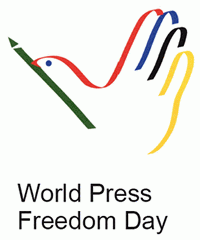Matilda Bogner on World Press Freedom Day
SUVA (Pacific Media Watch): Pacific media, for the most part, is free to actively debate and discuss issues and express opinions, unlike media in some regions of the world where journalists face life and death decisions in pursuing certain stories. However, the region is by no means immune to restrictions on press freedom. The situation for some journalists in the Pacific is tenuous and in some countries a decline has been observed in recent years. Political upheaval in Fiji and Papua New Guinea, along with more subtle political agendas in a range of countries, have shown that press freedom is indeed a delicate flower in the Pacific. It needs to be nurtured in order to grow.
However, the region is by no means immune to restrictions on press freedom. The situation for some journalists in the Pacific is tenuous and in some countries a decline has been observed in recent years. Political upheaval in Fiji and Papua New Guinea, along with more subtle political agendas in a range of countries, have shown that press freedom is indeed a delicate flower in the Pacific. It needs to be nurtured in order to grow.
Some stark attacks on press freedom have arisen out of the current political impasse facing Papua New Guinea. Reports by journalist advocacy groups such as the International Federation of Journalists have documented assaults and intimidation of journalists reporting on political issues since the change of government in August last year.
April 2012 saw reports of a brutal attack by uniformed police officers on journalist Mark Kayok in Port Moresby. Kayok, a police rounds reporter with the National Broadcasting Corporation (NBC), reportedly sustained a broken nose among other injuries. In March, an armed police officer threatened the PNG Post Courier Business Editor, Patrick Talu, with a grenade, ordering him to leave an area or be blown up. Earlier in January soldiers at the Murray Barracks in Port Moresby reportedly threatened to shoot PNGFM radio reporter Tauna George.
Press freedom in Fiji is also a serious concern, despite the January removal of Public Emergency Regulations (PER), which restricted the right to public assembly and freedom of expression and gave the authorities broad powers of arrest and detention.
The UN High Commissioner for Human Rights, Navi Pillay, welcomed the lifting of the PER in Fiji as a step in the right direction. She encouraged the Fiji government to build on the momentum with concrete steps to ensure full respect for the rule of law and human rights.
Positive change
The removal of the PER signalled a positive change to the media landscape with the removal of blanket censorship of all Fiji media by Ministry of Information censors.
Despite this, however, it appears that a culture of self-censorship continues to exist for journalists in Fiji. A preliminary media content analysis conducted recently by my office, comparing Fiji’s two main daily newspapers, The Fiji Times and the Fiji Sun, before and after the lifting of the PER, suggests that there has been no distinguishable change in the level of criticism of the Fiji Government observed in either newspaper.
The research also suggests that in both papers there is a tendency to rely heavily on the Prime Minister and Attorney-General, Fiji government department spokespeople, sportspeople and private sector leaders, as sources, with little to no prominence given to alternative or critical voices, such as those from opposition political parties or civil society.
An environment of self-censorship is supported by provisions in the Media Industry Development Decree 2010. Overt media censorship, like that experienced under the period of emergency regulation, can be imposed by the government at any time under section 80 of the Decree. The Decree also provides for a range of fines and penalties (including imprisonment) for journalists, editors and publishers.
Recent history, combined with the provisions of the Decree, continues to have a chilling effect on the country’s news-media. This is particularly concerning as Fiji is entering a constitution-making process, followed by democratic elections, scheduled for 2014. If these processes are to be legitimate, opposition and critical voices need to be heard.
In 1993 the United Nations General Assembly declared 3 May to be World Press Freedom Day. The aim of the day is to acknowledge the importance of freedom of the press and to remind governments of their duty to respect and uphold the right to freedom of expression, enshrined under Article 19 of the Universal Declaration of Human Rights.
Opportunity to reflect
The day provides us with an opportunity to reflect on the media freedom environment around us and to defend the media from attacks on its independence. We must pay tribute to the 106 journalists killed worldwide in 2011, according to the International Federation of Journalists, along with the countless others who have faced intimidation, bullying and other forms of hardship.
This year’s World Press Freedom Day will inform citizens of violations of press freedom worldwide and remind them that in many countries around the world, publications are censored, fined, suspended and closed down, while journalists, editors and publishers are harassed, attacked, detained and murdered.
For its part, the United Nations Human Rights Office in the Pacific will continue to offer its support to Pacific Island governments to implement international human rights standards, including freedom of expression.
We will continue to advocate – both publically and privately – for enhanced press freedoms and for the protection and promotion of human rights in the region. The UN Human Rights Office looks forward to a future where all Pacific Islanders can realise their full human rights.
Matilda Bogner is the Regional Representative for the United Nations Office of the High Commissioner for Human Rights (OHCHR) Regional Office for the Pacific, based in Suva, Fiji.
Pacific Media Watch Pacific report 2011
This work is licensed under a Creative Commons Attribution-NonCommercial 3.0 New Zealand Licence.




